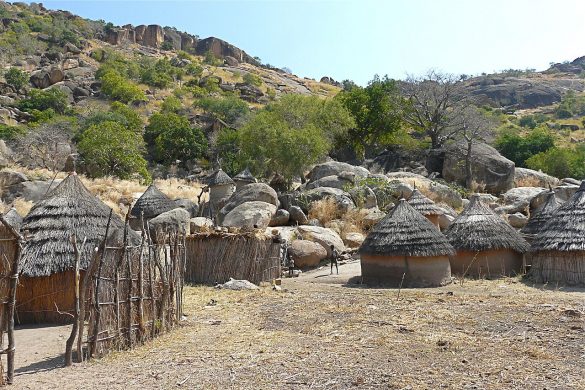30 September 2016, Rome (FAO): FAO's Mountain Partnership and Slow Food have launched a voluntary product label for mountain goods that's meant to improve market access for small highland producers from developing countries and highlight mountain products as distinct and sustainable.
The new label places a premium on goods that support local biodiversity and production methods that are linked to the cultural traditions of mountain communities. Products carrying the mountain label will be available in national markets, organic stores and specialty shops.
Among the flagship products that are part of the first phase of the Mountain Partnership Products initiative are apricots grown in the remote mountainous region of Batken in Kyrgyzstan and rare black amaranth grain produced in the Bolivian Andes.
A variety of other goods ranging from coffee to tea and spices from different mountain areas of developing countries will also be marketed under the new label, which will be available free of charge to mountain producers following a review of their products and production methods.
Ensure fair returns
By giving mountain products a distinguishable brand, the labeling scheme will help local producers win market recognition by guaranteeing that products are predominantly produced and transformed in mountain areas and come from small-scale production respectful of local ecosystems.
The scheme – which producers submit to voluntarily — is also designed to ensure fair returns for producers and the equitable distribution of profits along the entire value chain.
"We believe that a mountain label will attract consumers that are interested in high quality and environmentally sound products and give them the information they need to make conscious choices about the values, methods and communities they want to support with their purchases," said Rosalaura Romeo, program officer of the FAO's Mountain Partnership Secretariat.
The MP oversees the initiative with financial backing from the Italian Development Cooperation.
"Promoting biodiversity and supporting smallholder producers are both crucial actions to improve rural development and secure the future of mountain areas," said General Secretary of Slow Food Paolo Di Croce.
Despite their rich culture and environmental heritage, mountain communities remain economically marginalized, he added.
Remoteness limiting market access
One reason for this is that the remoteness and isolation of mountain areas often impede producers, limiting their access to markets, extension services, credit and information.
Additionally, the high number of middlemen in the value chain of many mountain products means that producers do not always obtain fair compensation.
By promoting high-value products that benefit biodiversity and equitable returns, the label allows consumers to buy into environmental conservation while reducing pressures that drive producers to engage in production methods harmful to the environment.
As such, it simultaneously addresses poverty and unsustainable use of natural resources in highland regions and contributes to the 2030 Sustainable Development Agenda – especially SDG1 on ending poverty in all its forms and SDG15 on the sustainable management of ecosystems and biodiversity.
How it works
The mountain label is not mandatory for mountain producers nor does it replace other labels their products may have to carry under national laws. But it's an easy tool for small scale producers and associations to set their wares apart in a positive way.
Those who wish to apply for the label can contact the Mountain Partnership Secretariat directly or through local MP focal points. Requests will be evaluated based on a set of criteria, including factors like the size of production, impact on the environment and the altitude at which the goods are made.
The Partnership will also oversee a verification system through which an appointed expert or authorized entity will periodically monitor a random sample of products carrying the Mountain Partnership Product label to ensure the goods still meet all guidelines.
For a select number of products, including those in Kyrgyzstan and Bolivia, FAO is providing additional support.
These interventions range from teaching producers new ways to scale up and add value to their existing production –in the case of the Kyrgyz apricots– to helping start up an entirely new production and distribution chain – in the case of the revival of black amaranth in Bolivia.
Partnership
The initiative merges the strengths of the Mountain Partnership in addressing highland-specific challenges through its global network with the experience of Slow Food in supporting traditional crops and products which risk disappearing, protecting unique ecosystems and recovering traditional processing methods.
The collaboration is part of a three-year agreement between FAO and Slow Food to promote more inclusive food and agriculture systems at local, national and international levels.
Slow Food joined the Mountain Partnership, the UN alliance dedicated to improving mountain livelihoods and environments, in March 2016.















